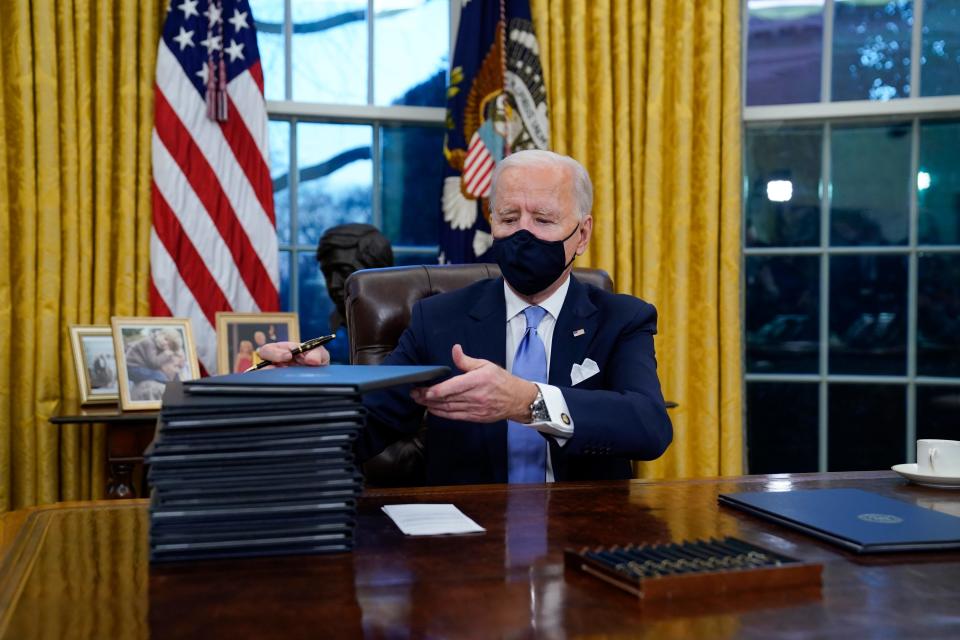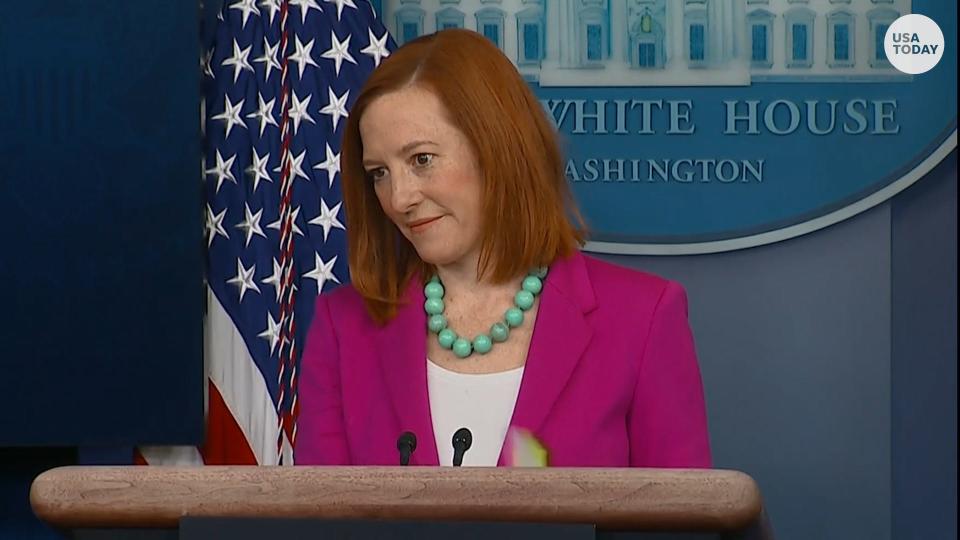Daily routine and a script are back in the Biden White House, but how long can it last?
WASHINGTON – After Joe Biden signed another raft of executive orders Tuesday, a reporter deviated from the day's theme – racial equity – to ask the president what he talked to Russian President Vladimir Putin about earlier in the day.
"You," Biden replied with a smile as he walked away from a desk in the White House State Dining Room. "He sends his best."
The exchange offered a rare off-script moment during the first days of Biden's administration that have brought rigid scheduling and routine back to the White House after four years of unpredictability under former President Donald Trump.
While Trump was known to keep adversaries, reporters and even allies on edge into the wee hours of the night – all wondering when the next tweet might come and what it might say – Biden has returned the White House to a schedule that resembles banker hours. The new president's tweets, always on message, are few and far between.
The drumbeat reflects Biden's push to restore a sense of normalcy in the White House amid turmoil, weeks after the Capitol came under siege by pro-Trump supporters and as the death toll from a raging pandemic surpasses 435,000.
More: Undoing Trump's policies and other things Biden did his first week as president
But it's unclear how long Biden can stick to his routine amid rising partisan conflicts in Congress and a slew of monumental challenges. Lawmakers are battling over Trump’s impeachment trial, Biden’s $1.9 trillion COVID-19 relief bill and calls from Democrats to boot far-right Republican members from Congress.
"It will require constant work. Many forces of commerce and human nature are arrayed against him, and countless obstacles stand in his path," journalist John Dickerson, among those who welcomes "boring" again in the White House, wrote in The Atlantic. "But if the country is lucky, entire days will pass without the president's activities agitating the public mind."
40 executive orders, carefully mapped out
The routine is intentional. It's purpose: Portray Biden as a problem-solving president focused on a convergence of crises, uninterested in not much else.
Biden's schedule has started with daily presidential intelligence briefings – something Trump famously neglected on occasion – during the 9 a.m. hour. He has then used most days to tout one of his core priorities – climate change, the federal government's COVID-19 response, health care and racial equity – before taking executive action on the topic.
Each rollout has been carefully choreographed.
More: Joe Biden rejoins Paris Agreement, requires masks on federal property in swift Day 1 directives
After orders are announced in the morning, aides specialized in the subject matter, including climate change envoy John Kerry and Susan Rice, director of Biden's Domestic Policy Council, have taken questions from reporters. In the afternoon, Biden has spoken on the latest topic, rarely ad-libbing from prepared remarks on a teleprompter. He has then sat down at a desk to sign a record first week of executive orders and directives – 40 so far with more on tap for next week.
Perhaps the biggest variation has been where he has signed the orders: the Resolute Desk in the Oval Office some days, an undersized desk in the State Dining Room on others.
By executive pen, he has rejoined the Paris Agreement on climate, ended Trump's travel ban from predominantly Muslim countries, canceled the Keystone XL Pipeline's permit and ended the nation's withdrawal from the World Health Organization.

The tight ship appears to have given the White House the early narrative it hoped.
"It's as if for the last four years, the country was left in the hands of an irresponsible teenage babysitter, where the mother and father leave and say: 'Don't call boys. Don't have alcohol,'" said Barbara Perry, director of presidential studies at the University of Virginia's Miller Center. "And now the parents are back. The father runs the household on a strict schedule with a plan."
More: Here are all the executive orders President Joe Biden has signed so far
Perry said it feels like a return of the "No-drama Obama years," a reference to eight years under Biden's former boss, President Barack Obama. She likened the White House's discipline thus far to the early days of President Ronald Reagan's term as his administration carefully worked to show him addressing a recession.
Biden, too, is trying to send a message, Perry said: "Let's get the government working again as a well-oiled machine, because if we don't the crises are going to take us out."
Press briefings, Dr. Fauci's return
Continuing an approach that allowed him to stay on message in the campaign, Biden has taken questions from reporters only a handful of times, limiting opportunities for the gaffes he has been prone to make over the years.
Questions are mostly confined to the return of daily White House press briefings, led by Press Secretary Jen Psaki. The White House also relaunched regular briefings from public health officials including Dr. Anthony Fauci, who was effectively shut out of White House appearances in the waning months of the Trump administration.
In between the president's brief speeches and signings of orders, Biden has taken calls with leaders of Japan, India, Germany, France and Russia's Putin. In another shift from Trump, Biden reportedly raised areas of contention with Putin, according to the White House. Those issues include reports of Russia placing bounties on American soldiers in Afghanistan, interference in the 2020 election and the poisoning of Putin opponent Alexei Navalny.
More: After Putin's initial snub, Biden talks nukes, cyberattack and poisoning with Russian leader
Biden has had "many conversations" with members of Congress, including Republicans, according to Psaki, as he seeks bipartisan passage of his $1.9 trillion COVID-19 relief bill, the American Rescue Act. But she declined to say which members of Congress, nor would she speculate on the location of Biden's first foreign and domestic trips.

Jay Carney, former press secretary for Obama and for Biden as vice president, credited the fast start on executive action to preparation as Trump contested the election.
"They knew they wanted to come out big early to demonstrate the change that they were bringing, and their seriousness and purpose to keep their promises and act on important things early," he said.
Carney said Biden's team – which includes several former Obama aides, including Biden's chief of staff, Ron Klain – and the president himself have benefited from their experiences confronting a financial crisis in 2009 when Obama entered office.
"It has that feel, but I'd say it's even better-executed and higher volume. They're doing more," he said, while acknowledging that the "pace is hard to sustain."
Republicans say Biden has abandoned inauguration pledge
White House "lids" – the White House term for no more official news for the day – typically come in the late afternoon or early evening. The president held no public events last weekend, nor did he have any on tap for this weekend.
After the unpredictability of the Trump years, even the smallest of disruptions and detours have been magnified. As Biden spoke about his administration's plans to purchase 200 million more COVID- vaccinations, a log toppled off the fireplace, causing a loud bang.
At another event, Biden's two German Shepherds were heard barking outside the Oval Office as he signed an executive order lifting Trump's ban on transgender people serving in the military.
More: Amid calls for unity, President Biden and Republicans don't agree what that looks like
U.S. Rep. Jim Cooper, D-Tenn., said Biden's approach is "night and day" from how Trump ran the White House, applauding "the organization, the efficiency, the sincerity" compared to Trump, who he said was "mainly in it for himself."
"It's kind of like the old Rolaids commercials. How do you spell relief? B-I-D-E-N," Cooper said. "The tricky thing will be, it's not enough to return to normal. Now we have to start making sure we improve on normal, because government has not been working well enough for working folks."
That challenge is trickier because Biden's central message of unity is proving elusive. He told Americans in his inaugural speech that "politics doesn’t have to be a raging fire" as he called on both parties to "start afresh." Not only a push for bipartisanship, it was also an appeal to return to civility and democratic norms.
Biden's disciplined start is meant to underscore those themes. But Republicans have slammed Biden's heavy use of executive action on progressive causes, arguing it will do more to divide than unite.
"Mr. President, we all watched your inauguration and took your words about unity and putting yourself in other people’s shoes to heart," Sen. Ted Cruz, R-Texas, and 23 other Republicans senators wrote Friday in a letter to Biden, slamming his orders aimed at the fossil fuel industry.
Arguing that Biden has put "thousands of good-paying jobs at risk," the senators said his orders have "the potential to further the divide between rural and urban America."
Rep. Jim Jordan, R-Ohio, tweeted Friday: "The Senate is divided 50/50. The House is almost equally divided. President Biden promised he’d work with Republicans. But he’s signed 40 executive orders and actions in nine days."
Hands-off on impeachment
The White House wants to portray Biden as focused on what it calls four "overlapping and compounding crises" – the COVID-19 pandemic, the resulting economic damage, climate change and lagging racial equity – not engaged in the political fights in Congress.
But the president's ability to stick to his routine will be tested as those pick up, particularly when Trump's impeachment trial in the Senate begins the week of Feb. 8.
Biden has taken a hands-off approach with Trump's impeachment trial, declining to say how senators should vote. He said the Senate can balance its "constitutional responsibilities on impeachment" while addressing "other urgent business of the nation."
After Biden, in an interview with CNN, predicted that the Senate lacked two-thirds majority to convict Trump, Psaki sought to make clear that he would defer to Senate leadership on the pace of the impeachment.
"And I can promise you that we will leave the vote counting to leaders in the Senate from now on," she said.
As Biden seeks congressional approval of his signature COVID-19 relief bill, support is mounting among Senate Democrats to pass the legislation via budget reconciliation if they can't find 60 votes, which would require support from 10 Republican senators. The reconciliation process would need just a simple majority.
Although such a maneuver would open him up to criticism for abandoning his campaign pledge of bipartisanship, Biden appears open to the idea. The president's priority is the bill's approval, according to the White House, not the process.
"I support passing COVID relief with support from Republicans if we can get it," Biden told reporters Friday when asked whether he supports reconciliation. "But the COVID relief has to pass. There’s no ifs, ands or buts.”
One area the White House won't be baited into: the controversy surrounding QAnon sympathizer Rep. Marjorie Taylor Greene, R-Ga., whom Democrats have increasingly condemned for past incendiary remarks.
Pressed on the matter, Paski said the White House doesn't have a response to possible disciplinary action for the congresswoman.
"And I'm not going to speak further about her, I think, in this briefing room." Asked again the next day, Psaki said, "We don’t want to elevate conspiracy theories further in the briefing room."
Contributing: The Associated Press. Reach Joey Garrison on Twitter @joeygarrison.
This article originally appeared on USA TODAY: Biden's start: Routine, order and a script are back in the White House

 money
money 